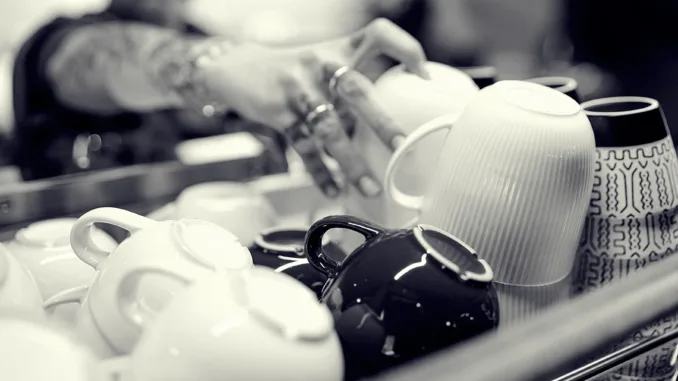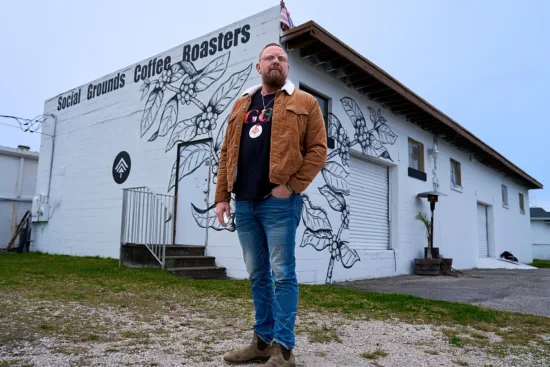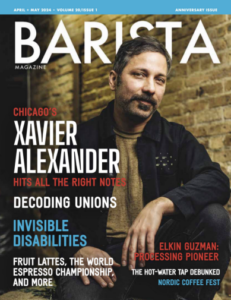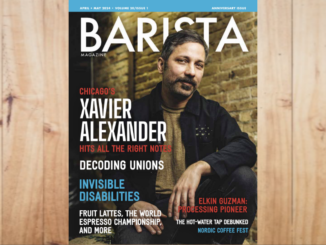
Many people in the coffee industry struggle with invisible illnesses that can impact their lives and work. These resources may help.
BY EMILY JOY MENESES
BARISTA MAGAZINE ONLINE
Featured photo sourced via Unsplash
In the April + May 2024 issue of Barista Magazine, we discuss how invisible illnesses can impact work in the café space. Invisible illnesses are those that can’t be immediately detected by an outside observer. They could be related to mental, physical, or neurological health; they could be immunity issues; they could be physical pains from an injury or arthritis. In short, an invisible illness is a condition that can negatively affect a person while at work, even if that person “looks fine.“

Struggles at Work
The often-demanding work in café spaces can set off a host of triggers in those who live with invisible illnesses. Standing on hard floors for hours at a time, having to move quickly, making repetitive motions like tamping and lifting, and other daily tasks can take their toll and cause flare-ups.
If you’re experiencing an invisible illness or disability, here are some steps you can take and resources to help you advocate for yourself at work.

Workplace Tips for Those with Invisible Illnesses
- Join a union. There are tons of barista unions—not just for baristas with invisible or visible disabilities, but for all baristas. Joining a union is a great way to build collective power and knowledge between you and your peers, so that you can advocate for your rights together. Do some research to find unions local to you.
- Know your state’s laws. While it’s tempting to put all of your trust into your bosses, some café leaders may try to bypass state laws surrounding their employees’ rights, scheduling, taking breaks, etc. Take matters into your own hands and do some research on your state’s laws so that you can stand up for yourself if needed.
- Prioritize rest. It’s tempting to fall into the trap of overworking, especially if you work in a fast-paced environment. However, pushing yourself to the point of burnout will only hurt you in the long run. If you’re a barista dealing with pain or a disability, prioritize rest; don’t be afraid to ask for time off, and combat feelings of shame or guilt. Your pain is valid and real, no matter what others think or say.
- If you’re able to, get proper medical documentation regarding your disability. When you don’t have proper medical documentation regarding your disability, it can be difficult to advocate for yourself and the accommodations you need. If you’re able to, go to the doctor and get the documents you need—and if you don’t have insurance, do some research on options for low-income and uninsured patients. Crowdfunding is also a powerful tool; don’t be afraid to ask for financial help from your surrounding community if you need it.
- Don’t be shy when asking for help. Asking for help with a physical task can be daunting—but most people are more understanding than you’d think. If you feel comfortable with your team, practice being more open about your physical struggles; don’t be shy about seeking help when you need it. By normalizing asking for help, you might encourage others around you to do the same.

Resources That Can Help
Workers United Union: Based in the U.S. and Canada, the Workers United Union is dedicated to defending health and safety rights for the working class, as well as helping others organize their own unions.
Invisible Disabilities Association: The Invisible Disabilities Association (IDA) is a nonprofit dedicated to educating the public about invisible disabilities and how to provide appropriate accommodations. The organization declared the third week of October “Invisible Disabilities Week”—a week for those with invisible disabilities to be more open about their struggles in order to raise awareness.
Americans with Disabilities Act Information and Assistance Hotline: This hotline is dedicated to providing information about the Americans with Disabilities Act and helping you understand how it may pertain to your situation. If you’re facing difficulties or discrimination at work, this is a good place to start to better understand your rights. The U.S. number is 1-800-514-0301, and the international number is 1-202-541-0301. For those with hearing or speech impairments, you can call 1-833-610-1264.
For more, be sure to check out “The Battle No One Sees: Invisible Disabilities in the Café Space“ in our print edition or here in the digital edition.
ABOUT THE AUTHOR
Emily Joy Meneses (she/they) is a writer and musician based in Los Angeles. Her hobbies include foraging, cortados, vintage synths, and connecting with her Filipino roots through music, art, food, and beverage.
Subscribe and More!
Out now: It’s the April + May 2024 issue of Barista Magazine! Read it for free with our digital edition. And for more than three years’ worth of issues, visit our digital edition archives here.
You can order a hard copy of the magazine through our online store here, or start a subscription for one year or two.




